Module 3 My First Ride on a Train Reading and Vocabulary课件()
文档属性
| 名称 | Module 3 My First Ride on a Train Reading and Vocabulary课件() |
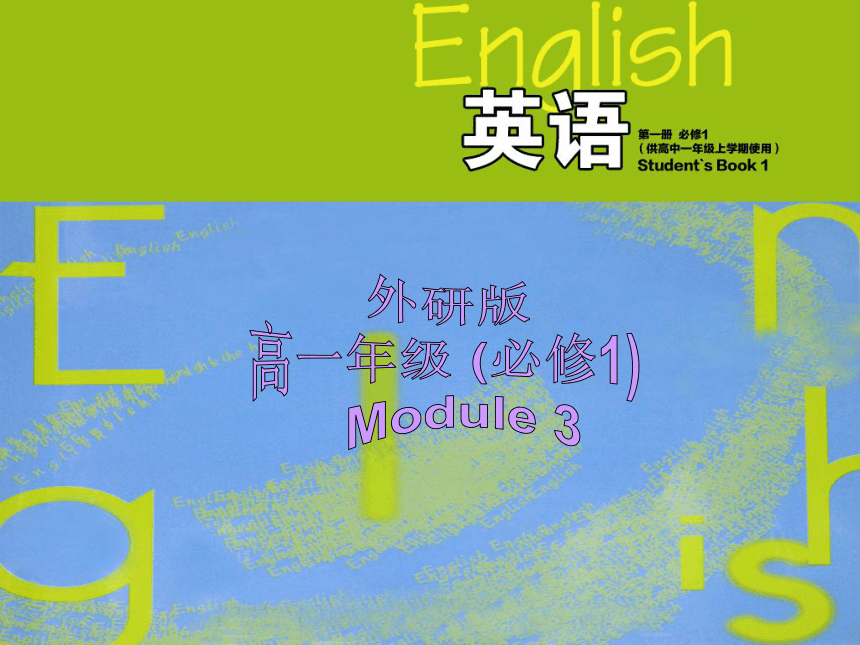
|
|
| 格式 | zip | ||
| 文件大小 | 3.6MB | ||
| 资源类型 | 教案 | ||
| 版本资源 | 外研版 | ||
| 科目 | 英语 | ||
| 更新时间 | 2022-01-27 13:51:47 | ||
图片预览

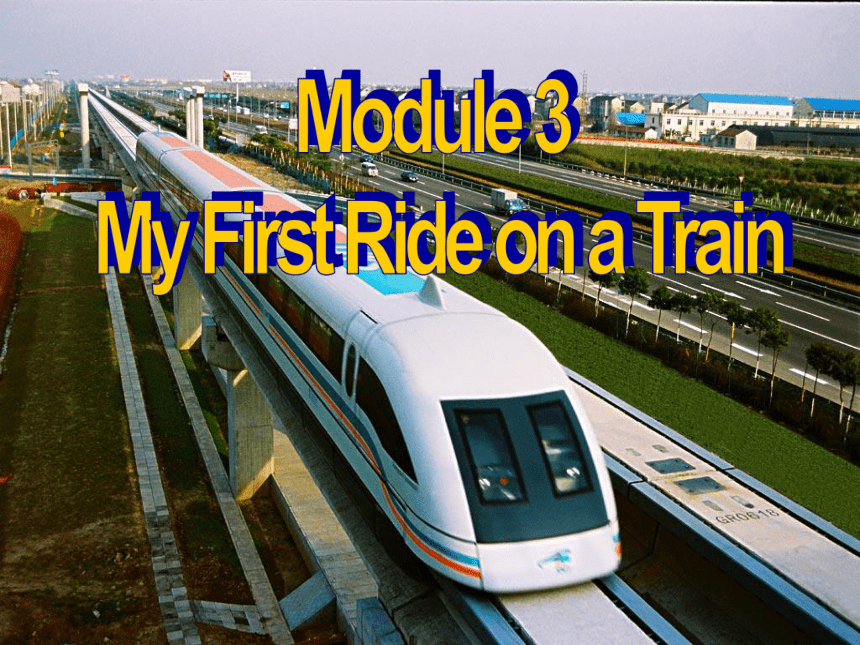
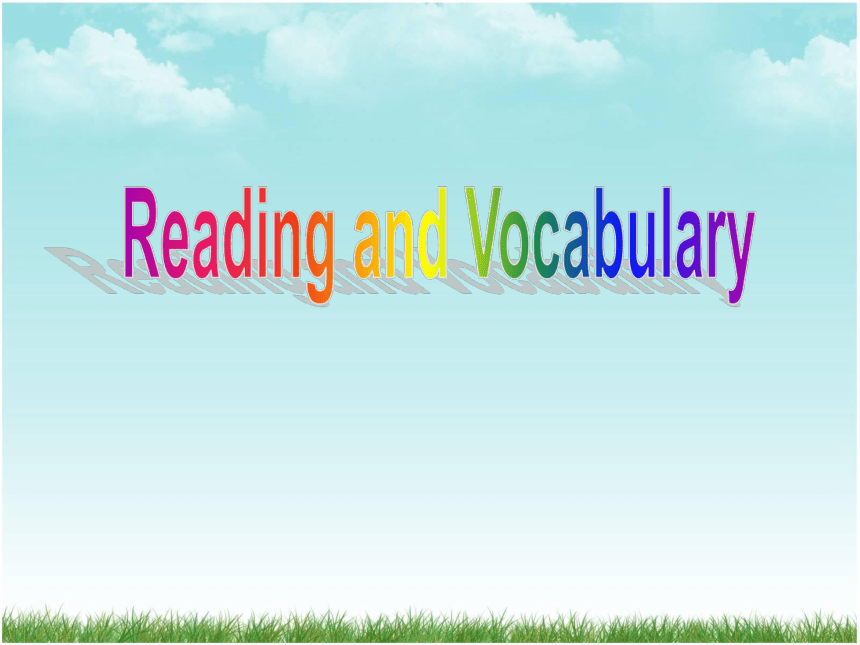
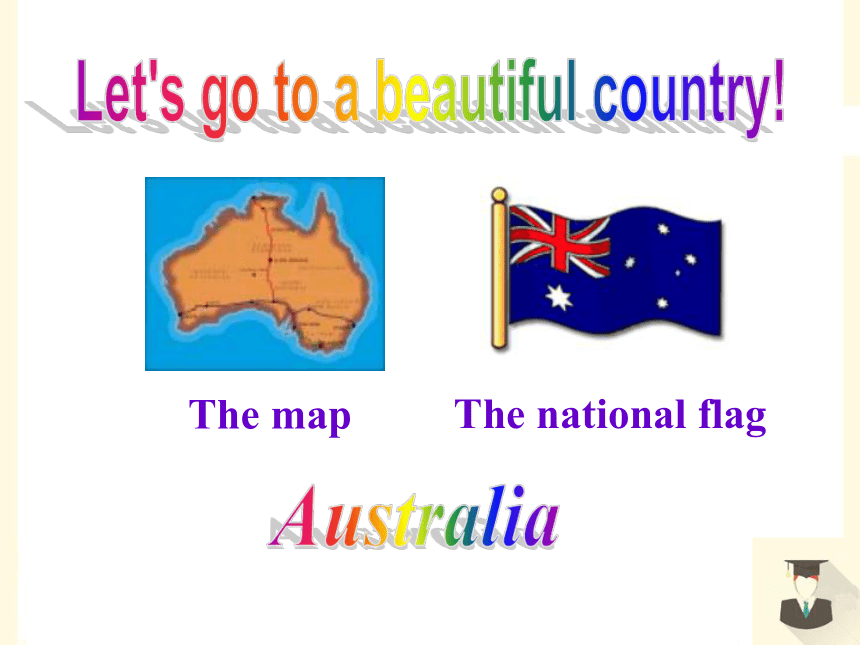
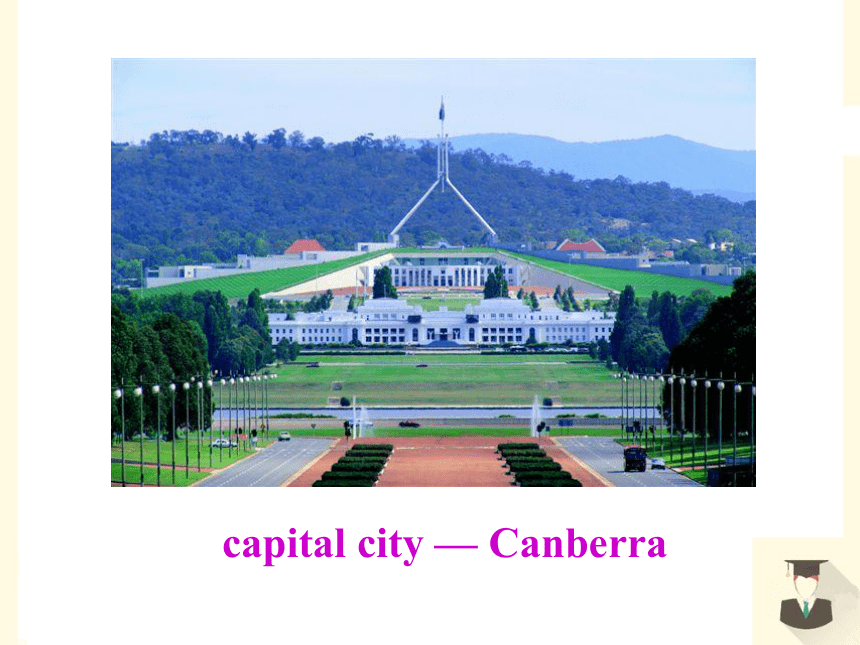
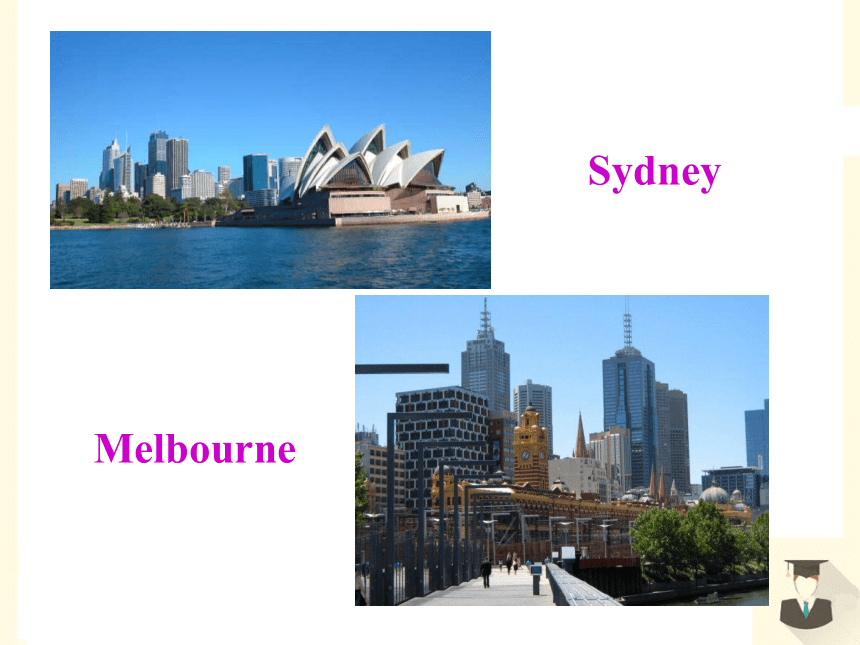
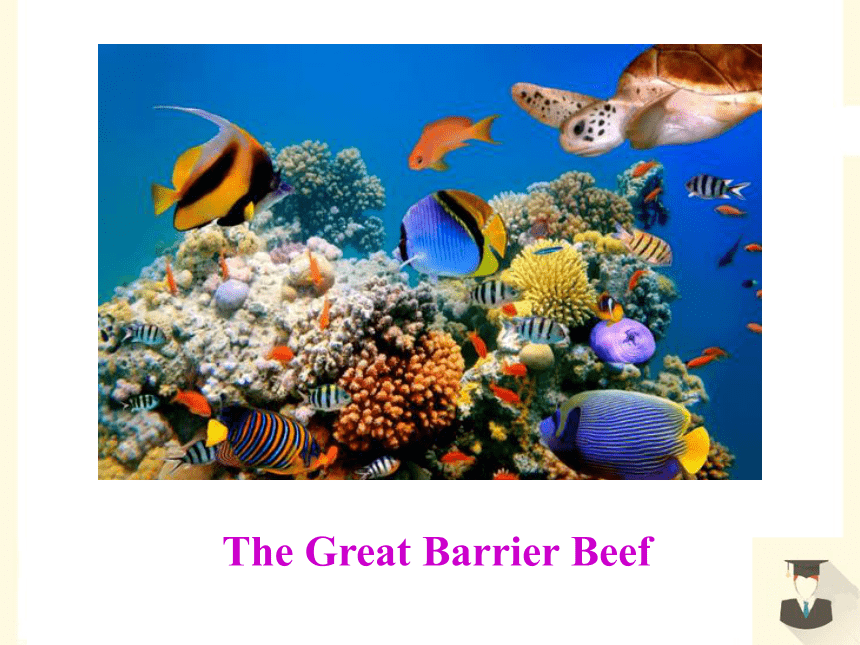
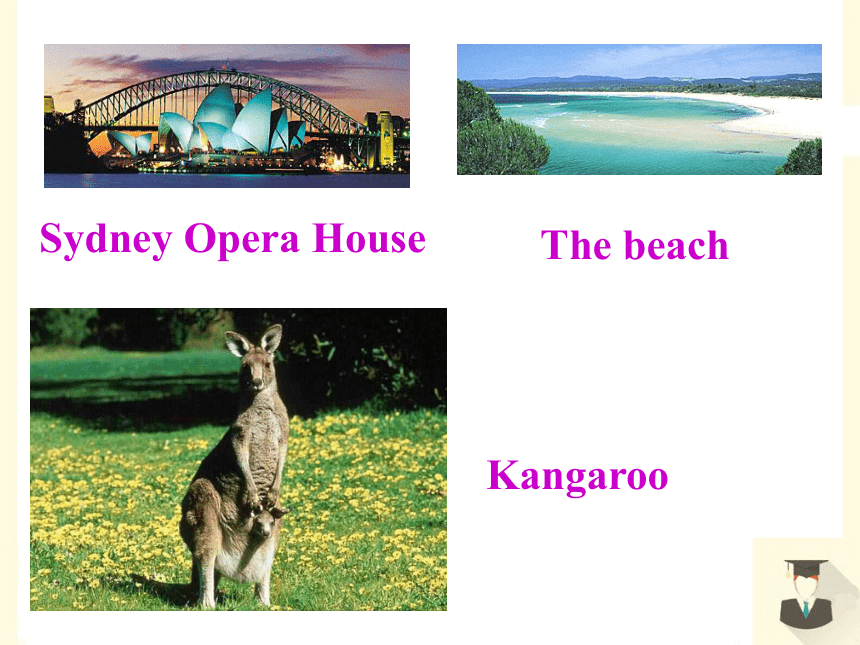

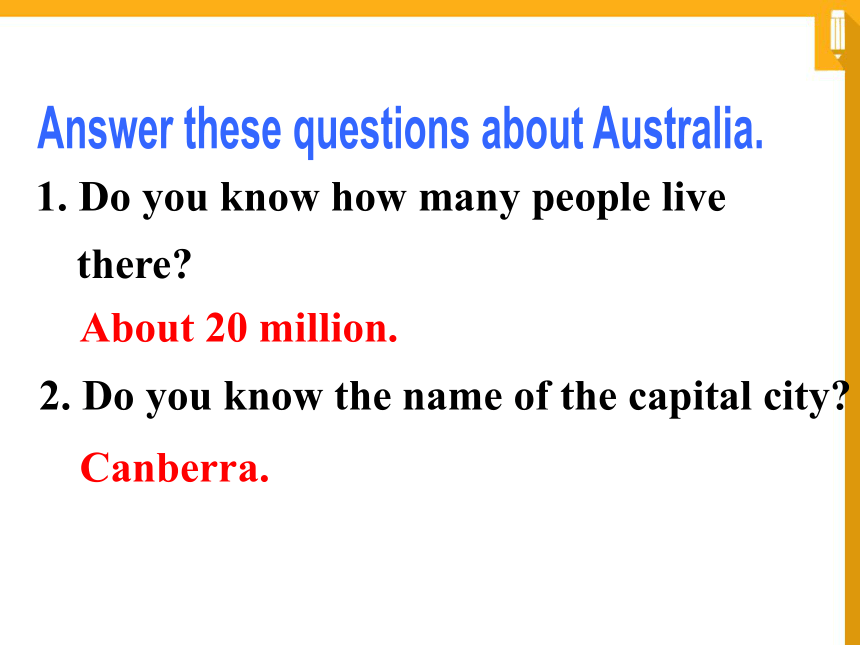
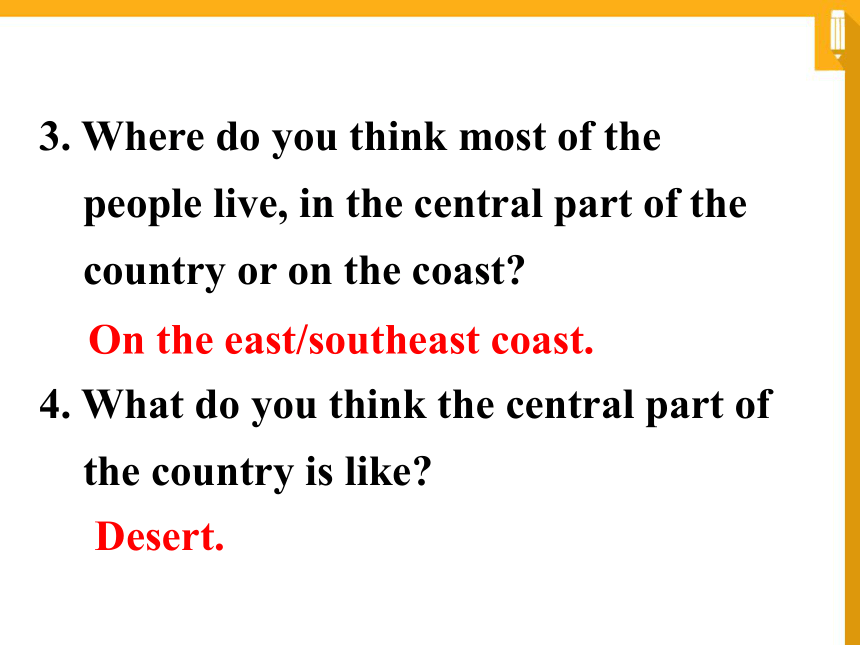
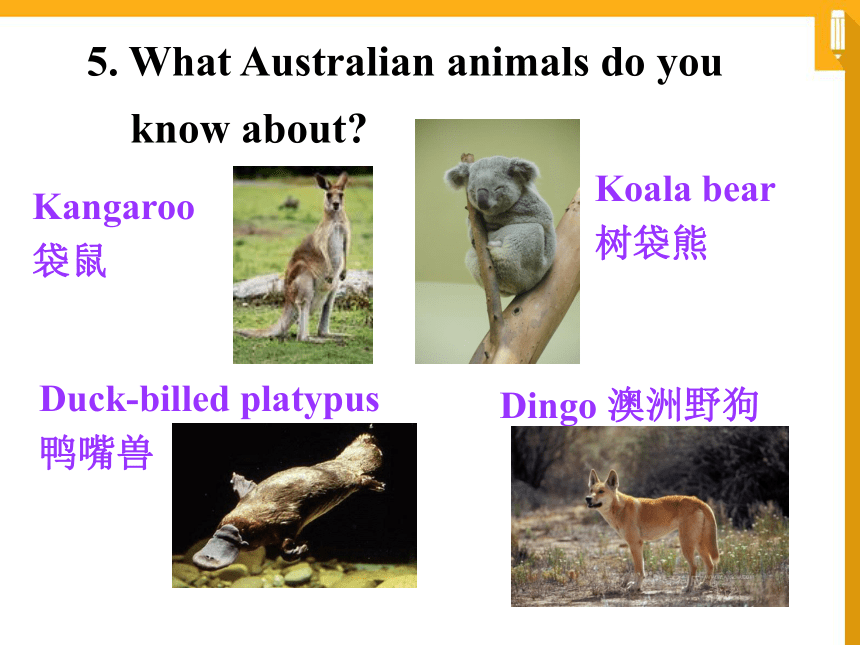
文档简介
(共50张PPT)
The map
The national flag
capital city — Canberra
Sydney
Melbourne
The Great Barrier Beef
Sydney Opera House
The beach
Kangaroo
1. Do you know how many people live there
2. Do you know the name of the capital city
About 20 million.
Canberra.
3. Where do you think most of the people live, in the central part of the country or on the coast
4. What do you think the central part of the country is like
On the east/southeast coast.
Desert.
5. What Australian animals do you know about
Kangaroo
袋鼠
Koala bear
树袋熊
Duck-billed platypus
鸭嘴兽
Dingo 澳洲野狗
abandoned camels cassette clouds colourful desert diamonds distance experts famous farms fields food government law meal midnight passengers products recently sand scenery shine shoot soil supply weather
Check the meaning of these words and match some of the words with these definitions.
an area of land where it is always dry
______
2. valuable stones _________
3. people who travel on a train, bus or plane _________
4. you find this on beaches _____
5. white or grey things made of water in the sky _______
6. where plants grow ________________
desert
diamonds
passengers
sand
clouds
soil / fields / farms
What’s the passage about
A. a train to Sydney
B. taking the train to Australia
C. traveling to the central part of Australia
D. a child visiting her grandmother
Paragraph 6
Paragraph 1
Paragraph 2
Paragraph 3
Paragraph 4
Paragraph 5
How many parts can we divide the passage into What is each about
I. Alice’s journey on the train.
II. Alice’s experience and feeling.
III. The history of the
transportation in Australia.
Read the passage again carefully and answer the questions.
No, she traveled on the train recently.
2. Was her destination on the coast of
Australia
No, it was Alice Springs in the center of Australia.
1. Did Alice travel on the train a long time ago
3. Was the scenery the same during the
whole journey
No, at first there were fields, then it was desert.
4. Did she study while she was on the train
Yes, she studied Chinese.
5. Did the Australians use horses to travel
to the central part of the country
Yes, at first, but the horses didn’t like
the hot weather.
6. Do they still use camels to deliver goods
No, they use the train now.
Read the passage and tell whether the following sentences true or false.
1. Alice had her first ride on the famous Ghan train with her parents.
2. Alice Springs lies in the middle of Australia.
3. Dark red soil was seen for the last few hundred kilometers of the journey.
4. Alice experienced completely different scenery during the journey.
5. Camels carried food and other supplies to Afghanistan.
6. After 1925, people could shoot the camels for their meat.
Read the text carefully and fill in the blanks.
The Ghan Sydney → Alice Springs
(Wonderful and comfortable)
Distance
It was over 1. _____ km. Alice and her friend spent two days and nights on the Ghan.
4000
Food The meals cooked by experts were great.
Scenery It was very 2. ________ for the first few hundred kilometres of the journey, and after that it was 3. _______. There were fields the soil of which was 4. ________. There were also 5. __________ farms built more than a hundred years ago.
colorful
desert
dark red
abandoned
Activities Alice looked out of the window,
talked to other passengers,
read books, listened to 6.
_______________ during the
day, and watched the night
sky one night.
Chinese cassettes
The coming of
the train’s name Before the 1920s At first, Australians tried riding 7. _______ to travel to the middle of the country. Later they brought some camels from Afghanistan. Ghan is short for Afghanistan.
horses
The coming of
the train’s name After the 1920s The government built 8. ____________ ___ which took the place of the camels from Afghanistan and was called the Ghan.
a new railway line
1. We got on in Sydney and we got off in Alice Springs…
注意上下车的表示法:
get on 上(车、船等)
get off 下(车、船等)
get into 上(车)
get out of 下(车)
2. We ate great meals cooked by experts!
1) great 在这里是“绝妙的,美味的”的
意思。
2) cooked 过去分词短语作后置定语。
e.g.
1) Do you know the woman _______ talking to Tom
2) Who are those people waiting outside
3)There were some children __________ swimming in the river.
4) I didn’t talk to the man _______ sitting next to me.
(who is)
(who were)
(who is)
5) The boy injured _________________ in the accident was taken to hospital.
6) Some of the people invited
_________________ to the party can’t come.
7) Most of the goods made
________________ in the factory are exported.
(=who was injured)
(=who was invited)
(=which are made)
8) The window broken __________________
in the storm has now been repaired.
9) Have you finished the exercises given
________________ by Mr. Li
10) The teacher is a very enthusiastic woman called ____________ Mrs. Shen.
(=which was broken )
(=which was given)
(who is called)
1) 我妈妈做的饭很好吃。
The food ___________________ is very nice.
2) 我们住在去年建的楼里。
We live in a building ____________.
cooked by my mother
built last year
3) Most of the artists _________ to the
party were from South Africa.
A. invited
B. to invite
C. being invited
D. had been invited
3. For the first hundred kilometers of the
journey, the scenery was very colorful.
scenery un. (自然风景/景色)
e.g. Have you seen the scenery of the
Alps
_____________________________
你领略过阿尔卑斯山的风光吗
scene cn.(某一特定环境呈现的)景色
(也指具体的/人活动的)情景/实况
e.g. The old man running after the dog
made ___________________.
老人正追着狗跑呈现出一个很有趣
的场景。
a very amusing scene
4. During the day, I sat and looked out of the window, and sometimes talked to other passengers.
during the day
在白天, 在白天期间
look out of 从…….往外看
5. On night, at about midnight, I watched the night sky for about on hour.
at midnight 在半夜
请注意at的用法:
at noon at night at midnight
at dawn at sunset at dinner time
at Christmas at one time
6. Ghan is short for Afghanistan.
Ghan是阿富汗的缩写。
be short for… 是……的缩写
e.g. Call me Jo——____________
Joanna.
叫我乔好了——这是乔安娜的简
称。
It’s short for
7. The Afghans and their camels did this
until the 1920s/1920’s.
在……世纪……年代(必须加the)
in the 2000s/2000’s 在21世纪
in the 1960s/1960’s 在20世纪60年代
in the 1850s/1850’s 在19世纪50年代
在某人十几/二十几/三十几……九十几岁
in one’s teens/twenties/thirties…nineties
e.g. When Marx was ___________, he
found it important to study the
situation in Russia.
当马克思五十几岁时,他发现研究俄
国形势很重要。
in his fifties
It is not rare in ___ that people in ___ sixties are going to university for
further education.
90s; the B. the 90’s; /
C. 90’s; their D. the 90s; their
8. Then the government built a new
railway line, so they didn’t need the
camels any more.
no more = not …any more 不再……
表示动作不再重复出现,与瞬间动词连用。
no longer = not …any longer
表示动作延续, 必须和表示延续动词连用
e.g. Ever since then, such accident has
_________________.
从那以后,这样的事故就没再出现
过。
They will not talk with each other any
longer.
____________________
no more appeared
他们彼此不再讲话了。
—Excuse me, is this Mr. Brown’s office
—I’m sorry, but he ____ work here ____. He left about 3 weeks ago.
A. doesn’t, now B. didn’t, no more
C. doesn’t, any more D. doesn’t, any longer
根据所给提示完成句子,每空一词。
1. ____ ___ _____ (自从二十世纪八十年代以来), the people’s living standard (生活水平) has improved greatly.
2. The man _______ __ (提及) at the last meeting is my cousin, Bob.
3. What _____ __ ________ (交通方式) will you use to get to the museum
Since the 1980s
referred to
means of transport
4. The railway station lies __ __ ______ ____ __ ___ ____ (城市中部).
5. Do you think everything that _____ ___ _____ (像金子一样闪亮) valuable stones
6. The law passed _____ ______ ___ _____ _______ (允许妇女上大学).
colleges
part of the city
in the central
shines like
allows women to attend
gold
1. Preview GRAMMAR1 The -ed form and answer the questions from passage.
2. Preview GRAMMAR2 Past tense time
expressions and try to complete sentences.
Write a passage about your first ride on a train.
2. Summarize the main phrases and words in the passage and remember them.
The map
The national flag
capital city — Canberra
Sydney
Melbourne
The Great Barrier Beef
Sydney Opera House
The beach
Kangaroo
1. Do you know how many people live there
2. Do you know the name of the capital city
About 20 million.
Canberra.
3. Where do you think most of the people live, in the central part of the country or on the coast
4. What do you think the central part of the country is like
On the east/southeast coast.
Desert.
5. What Australian animals do you know about
Kangaroo
袋鼠
Koala bear
树袋熊
Duck-billed platypus
鸭嘴兽
Dingo 澳洲野狗
abandoned camels cassette clouds colourful desert diamonds distance experts famous farms fields food government law meal midnight passengers products recently sand scenery shine shoot soil supply weather
Check the meaning of these words and match some of the words with these definitions.
an area of land where it is always dry
______
2. valuable stones _________
3. people who travel on a train, bus or plane _________
4. you find this on beaches _____
5. white or grey things made of water in the sky _______
6. where plants grow ________________
desert
diamonds
passengers
sand
clouds
soil / fields / farms
What’s the passage about
A. a train to Sydney
B. taking the train to Australia
C. traveling to the central part of Australia
D. a child visiting her grandmother
Paragraph 6
Paragraph 1
Paragraph 2
Paragraph 3
Paragraph 4
Paragraph 5
How many parts can we divide the passage into What is each about
I. Alice’s journey on the train.
II. Alice’s experience and feeling.
III. The history of the
transportation in Australia.
Read the passage again carefully and answer the questions.
No, she traveled on the train recently.
2. Was her destination on the coast of
Australia
No, it was Alice Springs in the center of Australia.
1. Did Alice travel on the train a long time ago
3. Was the scenery the same during the
whole journey
No, at first there were fields, then it was desert.
4. Did she study while she was on the train
Yes, she studied Chinese.
5. Did the Australians use horses to travel
to the central part of the country
Yes, at first, but the horses didn’t like
the hot weather.
6. Do they still use camels to deliver goods
No, they use the train now.
Read the passage and tell whether the following sentences true or false.
1. Alice had her first ride on the famous Ghan train with her parents.
2. Alice Springs lies in the middle of Australia.
3. Dark red soil was seen for the last few hundred kilometers of the journey.
4. Alice experienced completely different scenery during the journey.
5. Camels carried food and other supplies to Afghanistan.
6. After 1925, people could shoot the camels for their meat.
Read the text carefully and fill in the blanks.
The Ghan Sydney → Alice Springs
(Wonderful and comfortable)
Distance
It was over 1. _____ km. Alice and her friend spent two days and nights on the Ghan.
4000
Food The meals cooked by experts were great.
Scenery It was very 2. ________ for the first few hundred kilometres of the journey, and after that it was 3. _______. There were fields the soil of which was 4. ________. There were also 5. __________ farms built more than a hundred years ago.
colorful
desert
dark red
abandoned
Activities Alice looked out of the window,
talked to other passengers,
read books, listened to 6.
_______________ during the
day, and watched the night
sky one night.
Chinese cassettes
The coming of
the train’s name Before the 1920s At first, Australians tried riding 7. _______ to travel to the middle of the country. Later they brought some camels from Afghanistan. Ghan is short for Afghanistan.
horses
The coming of
the train’s name After the 1920s The government built 8. ____________ ___ which took the place of the camels from Afghanistan and was called the Ghan.
a new railway line
1. We got on in Sydney and we got off in Alice Springs…
注意上下车的表示法:
get on 上(车、船等)
get off 下(车、船等)
get into 上(车)
get out of 下(车)
2. We ate great meals cooked by experts!
1) great 在这里是“绝妙的,美味的”的
意思。
2) cooked 过去分词短语作后置定语。
e.g.
1) Do you know the woman _______ talking to Tom
2) Who are those people waiting outside
3)There were some children __________ swimming in the river.
4) I didn’t talk to the man _______ sitting next to me.
(who is)
(who were)
(who is)
5) The boy injured _________________ in the accident was taken to hospital.
6) Some of the people invited
_________________ to the party can’t come.
7) Most of the goods made
________________ in the factory are exported.
(=who was injured)
(=who was invited)
(=which are made)
8) The window broken __________________
in the storm has now been repaired.
9) Have you finished the exercises given
________________ by Mr. Li
10) The teacher is a very enthusiastic woman called ____________ Mrs. Shen.
(=which was broken )
(=which was given)
(who is called)
1) 我妈妈做的饭很好吃。
The food ___________________ is very nice.
2) 我们住在去年建的楼里。
We live in a building ____________.
cooked by my mother
built last year
3) Most of the artists _________ to the
party were from South Africa.
A. invited
B. to invite
C. being invited
D. had been invited
3. For the first hundred kilometers of the
journey, the scenery was very colorful.
scenery un. (自然风景/景色)
e.g. Have you seen the scenery of the
Alps
_____________________________
你领略过阿尔卑斯山的风光吗
scene cn.(某一特定环境呈现的)景色
(也指具体的/人活动的)情景/实况
e.g. The old man running after the dog
made ___________________.
老人正追着狗跑呈现出一个很有趣
的场景。
a very amusing scene
4. During the day, I sat and looked out of the window, and sometimes talked to other passengers.
during the day
在白天, 在白天期间
look out of 从…….往外看
5. On night, at about midnight, I watched the night sky for about on hour.
at midnight 在半夜
请注意at的用法:
at noon at night at midnight
at dawn at sunset at dinner time
at Christmas at one time
6. Ghan is short for Afghanistan.
Ghan是阿富汗的缩写。
be short for… 是……的缩写
e.g. Call me Jo——____________
Joanna.
叫我乔好了——这是乔安娜的简
称。
It’s short for
7. The Afghans and their camels did this
until the 1920s/1920’s.
在……世纪……年代(必须加the)
in the 2000s/2000’s 在21世纪
in the 1960s/1960’s 在20世纪60年代
in the 1850s/1850’s 在19世纪50年代
在某人十几/二十几/三十几……九十几岁
in one’s teens/twenties/thirties…nineties
e.g. When Marx was ___________, he
found it important to study the
situation in Russia.
当马克思五十几岁时,他发现研究俄
国形势很重要。
in his fifties
It is not rare in ___ that people in ___ sixties are going to university for
further education.
90s; the B. the 90’s; /
C. 90’s; their D. the 90s; their
8. Then the government built a new
railway line, so they didn’t need the
camels any more.
no more = not …any more 不再……
表示动作不再重复出现,与瞬间动词连用。
no longer = not …any longer
表示动作延续, 必须和表示延续动词连用
e.g. Ever since then, such accident has
_________________.
从那以后,这样的事故就没再出现
过。
They will not talk with each other any
longer.
____________________
no more appeared
他们彼此不再讲话了。
—Excuse me, is this Mr. Brown’s office
—I’m sorry, but he ____ work here ____. He left about 3 weeks ago.
A. doesn’t, now B. didn’t, no more
C. doesn’t, any more D. doesn’t, any longer
根据所给提示完成句子,每空一词。
1. ____ ___ _____ (自从二十世纪八十年代以来), the people’s living standard (生活水平) has improved greatly.
2. The man _______ __ (提及) at the last meeting is my cousin, Bob.
3. What _____ __ ________ (交通方式) will you use to get to the museum
Since the 1980s
referred to
means of transport
4. The railway station lies __ __ ______ ____ __ ___ ____ (城市中部).
5. Do you think everything that _____ ___ _____ (像金子一样闪亮) valuable stones
6. The law passed _____ ______ ___ _____ _______ (允许妇女上大学).
colleges
part of the city
in the central
shines like
allows women to attend
gold
1. Preview GRAMMAR1 The -ed form and answer the questions from passage.
2. Preview GRAMMAR2 Past tense time
expressions and try to complete sentences.
Write a passage about your first ride on a train.
2. Summarize the main phrases and words in the passage and remember them.
